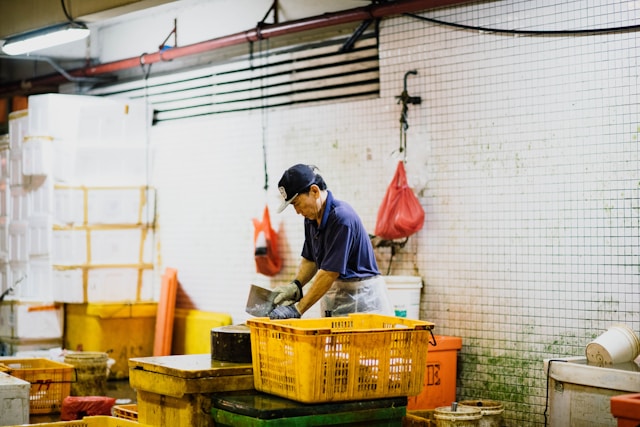$40/hr Grocery Worker Jobs for Immigrants With Visa Sponsorship
Moving to a new country is a monumental step, often driven by the dream of better opportunities, stability, and a brighter future. For many immigrants, securing well-paying employment with visa sponsorship is the cornerstone of this dream. While tech and healthcare often dominate the conversation about sponsored jobs, the essential grocery sector presents a surprising and often overlooked avenue for stable, rewarding work – sometimes even reaching impressive pay scales like $40 per hour. This article is your comprehensive guide to understanding and finding these $40/hr grocery worker jobs for immigrants with visa sponsorship.
We’ll explore the types of roles available, the reality behind the $40/hr figure, the visa sponsorship process, where to find these opportunities, and how to prepare a winning application. Whether you’re looking for an entry point into the workforce or leveraging existing retail experience, the grocery industry might hold the key to your successful immigration journey.
Why Consider the Grocery Sector for Sponsored Jobs?
The grocery industry is fundamental to any economy. People always need food, making supermarkets and grocery stores remarkably resilient, even during economic downturns. This inherent stability translates into consistent demand for workers across various departments and skill levels. For immigrants seeking reliable employment, this is a significant advantage.
Beyond stability, the grocery sector offers:
- Variety of Roles: From stocking shelves and managing inventory to customer service, baking, butchery, and store management, there’s a wide range of positions available. This diversity means opportunities exist for individuals with different backgrounds, skills, and career aspirations.
- Essential Service Status: Grocery workers are often classified as essential workers, highlighting the critical nature of their roles. This recognition can sometimes translate into better job security and, in certain situations or locations, potentially higher wages or specific visa pathways.
- Skill Development: Many grocery roles provide on-the-job training, allowing employees to develop valuable skills in customer service, inventory management, food safety, and potentially specialized areas like deli or bakery operations.
- Career Advancement: Starting in an entry-level position doesn’t mean staying there. Many grocery chains prioritize internal promotion, offering paths to supervisory, departmental management, or even store management roles, which come with increased responsibility and pay.
- Demand & Sponsorship Potential: Due to high demand and sometimes labor shortages in specific regions or roles, grocery employers are increasingly open to sponsoring foreign workers to fill essential positions. This is especially true in countries with structured temporary foreign worker programs.
This consistent need for staffing makes the grocery sector a practical target for immigrants seeking visa-supported employment. It’s a field where hard work and reliability are highly valued.
Understanding Visa Sponsorship in the Grocery Industry
Visa sponsorship means an employer offers you a job and agrees to assist with or handle the necessary paperwork and processes required for you to obtain legal authorization to work in their country. This is a crucial pathway for immigrants who don’t already have work rights.
In the context of grocery jobs, sponsorship typically involves temporary work visas. Common examples include:
- Temporary Foreign Worker Programs (TFWP) (e.g., in Canada): Employers often need to demonstrate that they couldn’t find a suitable local candidate (via a Labour Market Impact Assessment or LMIA) before hiring a foreign worker.
- H-2B Visas (USA): For temporary non-agricultural workers, sometimes applicable to seasonal peaks or specific temporary needs in retail or warehousing associated with grocery operations.
- Skilled Worker Visas (Various Countries): While many entry-level grocery jobs might not meet the “skilled” threshold, supervisory, management, or specialized roles (like skilled butchers or bakers) might qualify under certain country-specific skilled migration streams if the employer supports the application.
Employer Requirements: Generally, the sponsoring employer must prove a genuine need for a foreign worker, comply with wage and working condition regulations, and often pay associated fees. They navigate the governmental procedures to get approval to hire you.
Applicant Requirements: You, as the applicant, will need to meet the job’s specific requirements (experience, skills), potentially demonstrate language proficiency (English or French, for example), pass health and background checks, and correctly complete your visa application forms. While grocery work is accessible, employers still look for reliability, a good work ethic, and often, customer service aptitude. For those exploring diverse paths, it’s worth noting that opportunities exist across various sectors, including roles like Accountant Jobs with Visa Sponsorship for Foreigners, which require a different skill set but follow similar sponsorship principles.
The $40/Hour Question: Reality vs. Expectation
The prospect of earning $40 per hour as a grocery worker is understandably attractive, but it’s essential to approach this figure with realistic expectations. While possible, it’s not typically the starting wage for most entry-level positions like cashier or stocker.
Factors influencing grocery worker pay include:
- Location: Wages are significantly higher in major cities or regions with a high cost of living (e.g., parts of California, New York, certain Australian cities, remote northern communities in Canada) compared to smaller towns or areas with lower living expenses. Some job boards show specialized roles like Ammonia Technicians hitting $40-45/hr, or skilled trades within or supporting the sector reaching this level.
- Specific Role: Management positions (Store Manager, Assistant Manager, Department Manager – e.g., Meat, Produce, Bakery) command higher salaries, potentially reaching or exceeding $40/hr ($80,000+ annually) depending on the store size, chain, and location. Specialized roles like experienced butchers, high-volume bakers, or potentially specialized inventory/logistics coordinators might also reach this level. Search results from Australia show assistant manager roles advertised in the $30-$40/hr range.
- Unionization: In areas where grocery workers are represented by strong unions, wages and benefits tend to be higher and standardized, potentially pushing experienced workers or specialized roles towards the $40/hr mark.
- Experience and Seniority: Long-term employees with significant experience naturally earn more than new hires. Reaching a $40/hr wage might be achievable after several years of service and potentially promotions.
- Employer: Large, established grocery chains may offer more competitive wages and benefits packages compared to smaller, independent stores. Certain premium or specialty grocery stores known for higher quality or service might also pay more.
The Key Takeaway: While $40/hr is achievable within the grocery sector, it’s usually associated with management, specialized skills, high-cost locations, or significant experience. However, the industry does offer solid wages, benefits (often including health insurance and retirement plans, especially with larger chains), and importantly, opportunities for visa sponsorship, making it a viable and potentially lucrative path for immigrants, even if the starting wage is more modest. The focus should be on securing a sponsored job first, then working towards higher earnings through experience and advancement.
Types of Grocery Jobs That May Offer Visa Sponsorship
The range of jobs within a grocery store is vast. Here are some common roles where immigrants might find visa sponsorship opportunities, keeping in mind that availability depends on employer needs and local labor market conditions:
Stock Clerks / Night Crew / Replenishers
These roles involve receiving shipments, unpacking goods, organizing storage areas, and stocking shelves. It often requires physical stamina and the ability to work efficiently, sometimes during overnight shifts. Pay is typically entry-level but essential for store operations.
Cashiers
Cashiers handle customer transactions, process payments, and provide basic customer service. This role requires good communication skills, numeracy, and trustworthiness. Given the customer-facing nature, language proficiency is often important. Opportunities specific to this role exist, such as Cashier Jobs with Visa Sponsorship for Foreigners in Canada, highlighting the demand.
Deli, Bakery, Meat, and Produce Department Associates
These roles involve more specialized tasks like slicing meats and cheeses, preparing baked goods, cutting meat, or managing fresh produce. They often require specific skills, knowledge of food safety, and strong customer interaction. Experienced butchers or bakers might command higher wages and have better sponsorship prospects.
Customer Service Representatives / Front-End Staff
Beyond cashiering, some stores have dedicated customer service desks handling returns, inquiries, loyalty programs, and resolving issues. Excellent communication and problem-solving skills are key.
Warehouse Workers / Order Pickers (Associated Roles)
Larger grocery chains operate distribution centers. Roles here involve receiving, storing, picking, and shipping goods to individual stores. These jobs often require forklift operation or experience with warehouse management systems and can sometimes offer sponsorship.
Assistant Managers / Department Supervisors
These roles involve overseeing specific departments or shifts, managing staff, handling inventory control, ensuring compliance with store policies, and driving sales. They require leadership skills, experience in retail (often grocery-specific), and offer significantly higher pay, potentially reaching the $40/hr range. Sponsorship is more likely for these roles if the employer faces challenges finding experienced local candidates. This pathway shows potential for growth within the sector.
Finding Sponsored Grocery Jobs: Strategies and Resources
Landing a sponsored job requires proactive searching and targeted applications. Here’s where to look:
- Major Job Boards: Websites like Indeed, ZipRecruiter, LinkedIn, Monster, and Glassdoor allow you to filter searches by keywords like “visa sponsorship,” “grocery,” “supermarket,” and specific job titles. Be persistent and check regularly. Search results often show listings explicitly mentioning sponsorship availability or targeting foreign workers.
- Company Career Pages: Go directly to the websites of large grocery chains operating in your target country (e.g., Kroger, Albertsons, Safeway, Publix in the US; Loblaws, Sobeys, Metro in Canada; Tesco, Sainsbury’s in the UK; Woolworths, Coles in Australia). They often have dedicated careers sections where they list all openings, sometimes indicating if sponsorship is possible.
- Government Job Banks: Official government websites often list jobs approved for foreign workers. For example, Canada’s Job Bank has listings with approved Labour Market Impact Assessments (LMIAs), indicating the employer is ready to hire internationally. Saskatchewan’s government website details the SINP process for hiring foreign workers for permanent jobs.
- Specialized Immigration Job Portals: Websites dedicated to visa-sponsored jobs (like AllWorkVisa.com) aggregate opportunities across various sectors, including retail and grocery. These platforms are specifically designed for international job seekers.
- Networking: Connect with people from your community already living and working in your target country. They might have insights into employers known for hiring foreign workers or hear about unadvertised openings.
- Recruitment Agencies: Some agencies specialize in placing foreign workers, including in retail or general labor positions. Research reputable agencies that work within the grocery or retail sector.
When searching, use variations of keywords: “supermarket clerk sponsorship,” “grocery manager visa,” “foreign worker grocery store,” “retail visa job,” etc. Be prepared to look beyond major cities, as opportunities might be more prevalent in smaller towns or regions experiencing labor shortages. Also, keep an open mind about related sectors; sometimes skills are transferable, and you might find leads by exploring postings like Foreigners Visa Sponsorship for Housekeeping Jobs in Canada, as employers needing staff in one area might need them in others too.
Exploring Opportunities: Sponsored Jobs and Related Topics
Finding the right opportunity requires exploring various avenues. Below are tables showcasing sample sponsored job roles (including some outside the direct grocery sector but often filled by immigrants) and related essential topics for newcomers navigating life abroad.
Table 1: Sample Sponsored Job Opportunities (Accessible Roles)
| Job Title (with Link) | Estimated Salary Range (USD per hour) |
| Fruit Picker Jobs with VISA Sponsorship | $15 – $25 (Often piece-rate based) |
| Work as a Delivery Driver in Canada with Visa Sponsorship | $16 – $28 |
| Dog Walker Jobs with Sponsored Visas and Relocation Packages | $15 – $30 |
| Barbering Jobs in Canada with Visa Sponsorship for Foreigners | $18 – $35+ (Plus tips) |
| Jobs Openings At 101243971 Saskatchewan Ltd. – Foam Lake, SK | Varies by position (Check link) |
Note: Salary ranges are estimates and can vary significantly based on location, employer, experience, and specific visa program rules (e.g., prevailing wages).
Table 2: Exploring Other Visa-Sponsored Career Paths
| Job Title (with Link) | Estimated Salary Range (USD per hour) |
| Web Developer Jobs with Visa Sponsorship in Canada | $30 – $60+ |
| Data Analyst Jobs in Canada with Visa Sponsorship for Foreigners | $28 – $55+ |
| Civil Engineer Jobs with Visa Sponsorship for Foreigners | $35 – $70+ |
| Security Guard Careers in Canada for Foreigners with Visa Sponsorship | $17 – $30 |
| Accountant Jobs with Visa Sponsorship for Foreigners | $25 – $50+ |
Note: Salary ranges are estimates and subject to variation based on location, experience, qualifications, and employer.
Table 3: Navigating Personal Life Abroad: Marriage & Visas
| Topic (with Link) | Brief Description / Relevance for Immigrants |
| USA Marriage Visa to get Permanent Residency | Information on pathways to US green cards through marriage to a US citizen or permanent resident. |
| Getting Canada Marriage & Job Visa Sponsorship | Exploring options that combine relationship-based immigration with work authorization in Canada. |
| How to Search a Partner Abroad with Free Visa Sponsorship | Guidance on navigating international relationships and potential sponsorship avenues (approach with caution). |
| Canada Inland vs. Outland Spousal Sponsorship: Which Path is Right for You? | Comparing the two main processes for sponsoring a spouse or partner for Canadian permanent residence. |
| US CR1/IR1 Spouse Visa Guide: Bringing Your Husband or Wife to America | Detailed guide on specific US visa categories for spouses of US citizens living abroad or immigrating together. |
Caption: Building a life abroad often involves personal relationships. Understanding marriage-based visa options is crucial for immigrants planning their future with partners.
Preparing a Strong Application for a Sponsored Grocery Job
Once you’ve identified potential opportunities, crafting a compelling application is key. Remember, you’re competing not only with other international applicants but also potentially with local candidates.
- Optimize Your Resume/CV:
- Highlight any previous retail, customer service, food handling, or manual labor experience.
- Emphasize reliability, punctuality, teamwork, and a strong work ethic using action verbs.
- Tailor it to the specific job description, matching keywords where possible.
- Keep it concise and easy to read (usually 1-2 pages).
- Clearly state your current location and your need for visa sponsorship (or your existing work authorization if applicable).
- Write a Targeted Cover Letter:
- Address it to the hiring manager if possible.
- Express genuine interest in the specific grocery store/chain and the role.
- Briefly explain why you are a good fit, connecting your skills to their needs.
- Clearly and politely state your requirement for visa sponsorship to work legally in the country.
- Keep it professional, concise, and error-free.
- Language Proficiency: If the job requires customer interaction or teamwork, be prepared to demonstrate your language skills (English, French, etc.). This might involve standardized tests (like IELTS or CELPIP for Canada) or simply performing well in an interview.
- Gather Documents: Have digital copies of your passport, educational certificates, reference letters, and any relevant work permits ready. You’ll need these for the job application and the subsequent visa process.
- Prepare for Interviews: Practice common interview questions. Be ready to discuss your experience, your work ethic, how you handle challenging situations (e.g., difficult customers), and why you want to work for that specific employer. Be prepared to discuss your visa situation professionally.
Finding stable accommodation upon arrival is also crucial. Researching Affordable Temporary Housing Options in the UK for Immigrants: Alternatives to Airbnb (or similar resources for your target country) beforehand can ease the transition.
The Visa Application Process: A Simplified Overview
If an employer offers you a sponsored job, the formal visa process begins. While specifics vary greatly by country, the general steps often include:
- Job Offer: You receive a formal, written job offer that meets the requirements for visa sponsorship (e.g., full-time, meets wage standards).
- Employer’s Role (Initial Stages): The employer typically initiates the process. This might involve applying for Labour Market Impact Assessment (LMIA) in Canada, filing a petition (like Form I-129 for H-2B visas in the US), or obtaining a Certificate of Sponsorship (UK). This step proves to the government that they need to hire a foreign worker.
- Applicant’s Role (Work Permit/Visa Application): Once the employer gets the necessary pre-approval (if required), you will apply for your work permit or visa through the country’s immigration authorities (e.g., IRCC in Canada, USCIS/Department of State in the US, Home Office in the UK). This involves detailed forms, supporting documents (job offer, passport, photos, police certificates, medical exams), and application fees.
- Biometrics and Medical Examination: Most work visa applications require you to provide fingerprints and a photograph (biometrics) and undergo a medical examination by an approved panel physician.
- Interview (Potentially): Depending on the country and visa type, you might be required to attend an interview at a consulate or embassy in your home country or region.
- Decision and Travel: If approved, you’ll receive your visa or work permit authorization, allowing you to travel to the country and begin working for your sponsoring employer.
This process can take several weeks to many months, depending on the country, visa type, and application volumes. Patience and meticulous attention to detail are crucial. Understanding the broader immigration landscape, including pathways for various professions like Civil Engineer Jobs with Visa Sponsorship for Foreigners, can provide context, even if applying for a different role.
Challenges and Important Considerations
While the grocery sector offers promising opportunities, it’s important to be aware of potential challenges:
- Competition: Sponsored jobs are highly sought after. You need to stand out.
- Visa Complexity: Navigating immigration procedures can be daunting. Ensure you understand the requirements or consider seeking advice from authorized immigration consultants or lawyers (be wary of scams).
- Wage Realism: As discussed, the $40/hr figure isn’t standard for entry-level roles. Ensure the offered wage meets your financial needs and the legal requirements for the visa.
- Job Demands: Grocery work can be physically demanding, involve irregular hours (evenings, weekends, holidays), and require standing for long periods.
- Cultural Adjustment: Adapting to a new workplace culture, communication styles, and living environment takes time and effort.
- Visa Ties: Sponsored work permits are usually tied to a specific employer. Changing jobs often requires finding a new sponsor and potentially applying for a new work permit.
Despite these challenges, countless immigrants have successfully built careers and lives abroad starting in the grocery sector. Preparation, persistence, and a positive attitude are key ingredients for success.
Conclusion: Your Opportunity Awaits
The grocery industry presents a solid and often underestimated pathway for immigrants seeking stable employment with visa sponsorship. While the figure of $40 per hour might be reserved for specific high-level roles or locations, the sector offers accessible entry points, opportunities for growth, essential work status, and competitive wages that can provide a strong foundation for your new life abroad.
Landing these roles requires diligent research, targeted applications, a clear understanding of the visa sponsorship process, and realistic expectations about starting wages versus long-term potential. By utilizing online job boards, company career pages, government resources, and networking, you can uncover opportunities. Prepare your resume and cover letter meticulously, highlighting your reliability and relevant skills, and be ready to clearly communicate your need for sponsorship.
The journey requires effort and patience, but the reward – a stable job in a welcoming country – is well worth it. Start your search today, explore the resources available (including those on here), and take the first step towards achieving your immigration goals through the vital and dynamic grocery sector.











